Puppy's First Night

The first night with a new puppy is often an exciting time. However, it's not always easy for puppies to adjust to living in a new home. They may get anxious and bark during the night, or more commonly, howl wailingly throughout the night preventing hours of precious sleep. When this happens, it can be hard to not feel discouraged and wonder what's wrong, and if there's anything you can do to fix it.
First, you'll want to remember that it is completely normal, and even expected, for your puppy to be stressed or scared. Change can be scary, and up until this point, all your puppy has ever known is the safety of being with its mother and the rest of the litter. Think about this from an evolutionary standpoint. When their ancestors were puppies in the wild, they were vulnerable and easy prey for other, larger creatures. Pups would cry and make noise when separated from their mother to encourage her to stay near so that they would stay safe from any danger.
The same is true for your new puppy. They may be crying and whining a lot during the first night because they feel vulnerable and scared. Quite heartbreakingly, they are often calling out for their mother and signaling that they have been separated. Many new pet owners might make the mistake of putting their new puppy in another room the first few nights in an attempt to get a good night's sleep without constant whining and crying. However, this is not a good idea and could worsen the situation. You should expect a few sleepless nights when you first bring a puppy home. Unfortunately, it's just part of the job.
Aren't puppies lucky they're incredibly cute?
WHAT CAN YOU DO TO HELP YOUR PUPPY FEEL COMFORTABLE?
For starters, don't leave your new puppy alone. Your little one is still getting used to you and needs to learn that they can trust you. Dogs who are left alone will likely become even more anxious in a new environment. They will also likely make a mess when left by themselves.
Next, you'll want to use a plastic kennel during bedtime with a new puppy. There are many benefits of using a kennel, and the younger your dog is, the easier it is to train them to use it. Using a kennel at bedtime lets your dog know that it's time to sleep and gives them a space of their own to relax.
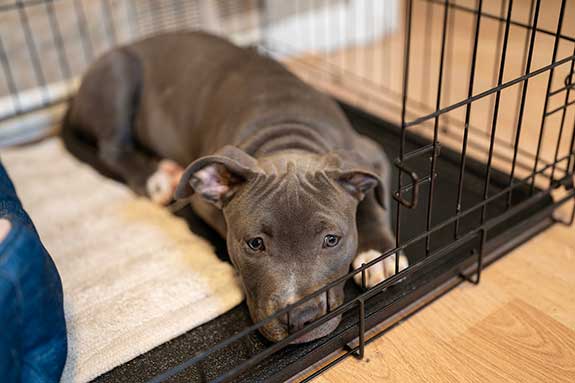
You'll want to make sure the crate is set up in a spot near you, preferably in your bedroom. This way, your puppy will be near you and won't feel isolated. You may also want to have a fan or some white noise playing during the night. This can help your puppy feel calmer and cover up any noise that might disturb them while they're trying to sleep.
Just because your new puppy is crated near you, however, doesn't mean that they won't still cry or whine the first few nights. It can be hard to know how to respond to this. Do they need attention or is it better to ignore them? This depends on the noises they are making.
Distress barking is common for puppies who are adjusting to a new home. This is characterized by whining and howling. Sometimes your pup may also pace anxiously or attempt to escape their kennel. If your puppy is doing this, it is a good idea to give them attention and comfort. You can sit closes to the kennel and speak to your puppy in a calm, soothing voice. You may even want to let them sniff or lick your hand or pet them. However, it's important that you are comforting rather than coddling your puppy. If you take your puppy out of their kennel because they are barking, they may start to learn that barking means they will be let out.
This leads to demand barking. Demand barking is repetitive barking when your puppy wants to be let out. Sometimes they may be doing so because they need a potty break, but other times, it is simply because they've learned that barking means they get to be let out and can run around the house and play. It can be hard to know what your puppy is trying to communicate to you, so it's helpful to give your puppy consistent bathroom breaks throughout the night. If you stick to regular times of letting them out, they will likely not associate barking with being let out.
DON'T FORGET ABOUT PLAYTIME!
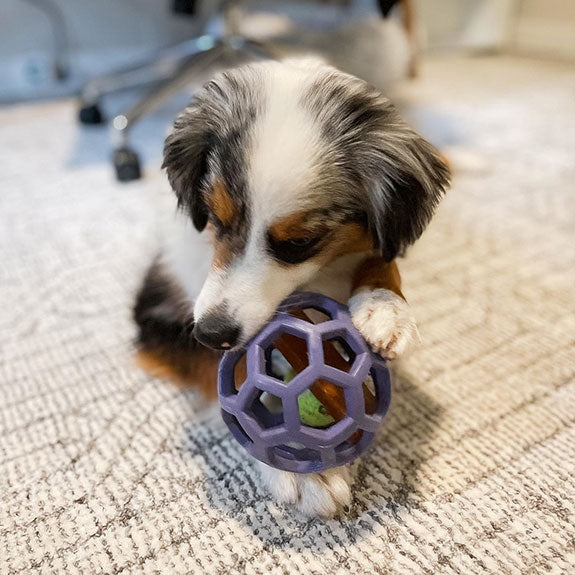
Just like young children, puppies have a lot of energy! It's a good idea to help them burn off some of their energy before bedtime so that they get worn out enough to get a good night's sleep. Puppy toys and interactive play are great ways to help burn off that energy. Puzzle and treat toys are also a great idea for keeping them busy and entertained before bed.
Even though the first few nights with a new puppy can be a challenge, remember that it will get easier! With a little time and patience, your puppy will soon be well adjusted to a new life with you.
Sources:
- https://www.petmd.com/dog/puppycenter/adoption/evr_dg_surviving_the_first_night_with_your_puppy
- https://www.vetbabble.com/dogs/getting-started-dogs/first-night-home-new-puppy-expect/
- https://pawleaks.com/puppys-first-night-at-home/
- https://www.preventivevet.com/dogs/crate-training-at-night-for-puppies
Previous article

Next article
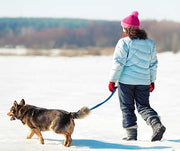
Related posts
View all-
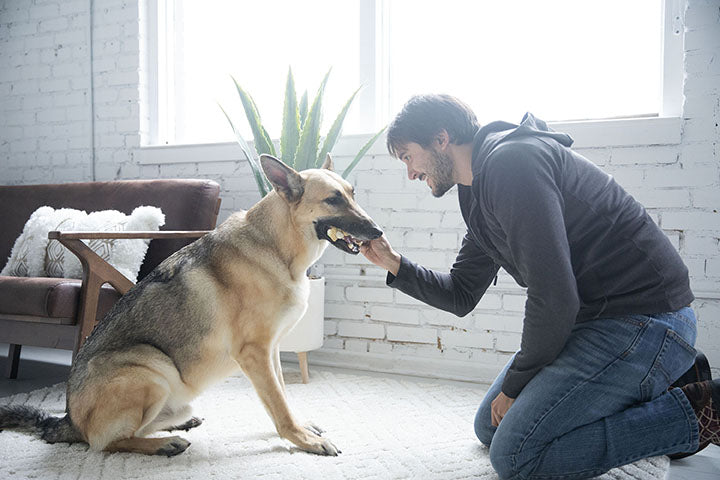
National Dog Week: 7 Fun Ways to Celebrate with Your Pup
The last full week of September marks National Dog Week: a tradition going strong since 1928. Founded by Captain William Lewis Judy, this celebration was created to promote responsible dog ownership, reduce the number of stray dogs, and honor the incredible role dogs play in our lives.
Read Article -
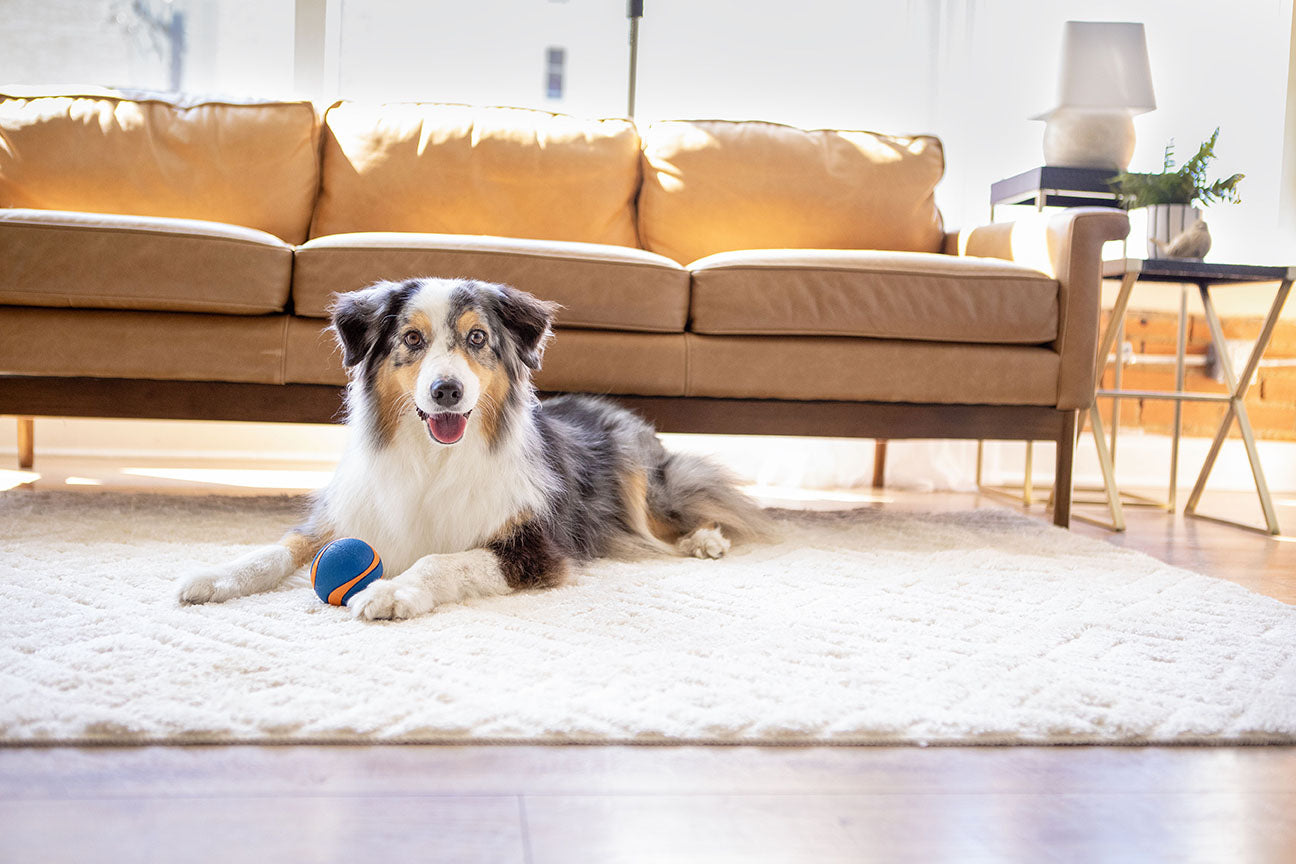
How to Prep Your Pet for Fall: Grooming and Wellness Tips
As the days grow shorter and the crisp air settles in, our routines naturally shift; long walks become brisk outings, and cozy nights become the norm. Like us, pets feel these changes. Helping them ease into the new season ensures they stay happy, comfortable, and healthy.
Read Article -

Vet-Approved Benefits of Fetch: How Play Supports Your Dog’s Health & Happiness
Whether it’s a spontaneous backyard sprint or a structured game of fetch, movement is one of the most powerful ways to nurture the bond between pets and their people.
Read Article



